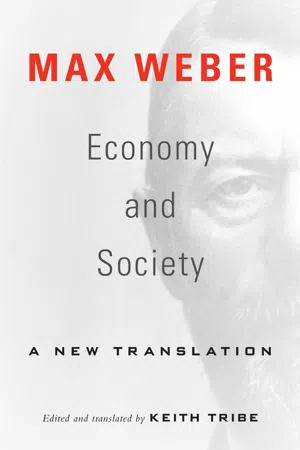
- English
- PDF
- Available on iOS & Android
About this book
The definitive new translation of Max Weber's classic work of social theory—arguably the most important book by the foremost social theorist of the twentieth century.
Max Weber's Economy and Society is the foundational text for the social sciences of the twentieth and twenty-first centuries, presenting a framework for understanding the relations among individual action, social action, economic action, and economic institutions. It also provides a classification of political forms based upon "systems of rule" and "rulership" that has shaped debate about the nature and role of charisma, tradition, legal authority, and bureaucracy.
Keith Tribe's major new translation presents Economy and Society as it stood when Weber died in June 1920, with three complete chapters and a fragment of a fourth. One of the English-speaking world's leading experts on Weber's thought, Tribe has produced a uniquely clear and faithful translation that balances accuracy with readability. He adds to this a substantial introduction and commentary that reflect the new Weber scholarship of the past few decades.
This new edition will become the definitive translation of one of the few indisputably great intellectual works of the past 150 years.
Frequently asked questions
- Essential is ideal for learners and professionals who enjoy exploring a wide range of subjects. Access the Essential Library with 800,000+ trusted titles and best-sellers across business, personal growth, and the humanities. Includes unlimited reading time and Standard Read Aloud voice.
- Complete: Perfect for advanced learners and researchers needing full, unrestricted access. Unlock 1.4M+ books across hundreds of subjects, including academic and specialized titles. The Complete Plan also includes advanced features like Premium Read Aloud and Research Assistant.
Please note we cannot support devices running on iOS 13 and Android 7 or earlier. Learn more about using the app.
Information
Table of contents
- Cover
- Title Page
- Copyright
- Contents
- Preface
- Introduction to Max Weber’s Economy and Society
- Overview of Chapter One
- 1. Basic Sociological Concepts
- Overview of Chapter Two
- 2. Basic Sociological Categories of Economic Action
- Overview of Chapter Three
- 3. Types of Rule
- Overview of Chapter Four
- 4. Social Ranks and Social Classes
- Appendix A: Translation Appendix
- Appendix B: The Definitional Paragraphs of Chapter 1
- Acknowledgements
- Index